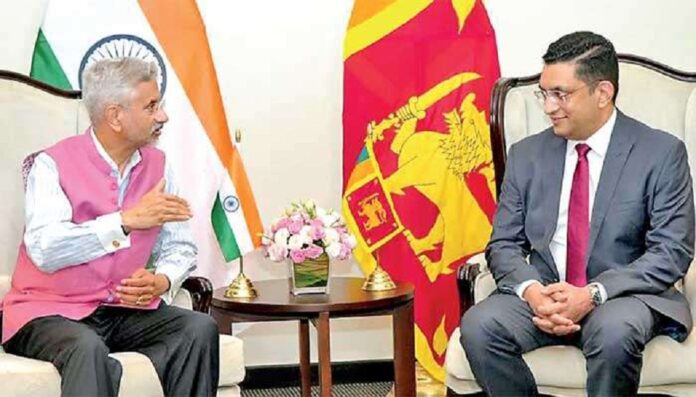Foreign Affairs Minister Ali Sabry last week hailed strong Indo-Lanka ties in context following India’s extension of support and relief for Sri Lanka’s external debt restructuring as the first bilateral creditor to do so and the official visit of External Affairs Minister Dr.S.Jaishankar.
India reiterated it will stand by Sri Lanka in its hour of need and expressed confidence in overcoming challenges.
During bilateral engagements between Dr. Jaishankar and President Ranil Wickremesinghe, Prime Minister Dinesh Gunawardena and Foreign Affairs Minister Ali Sabry, the two nations agreed to strengthen ties as well as pursue new measures to enhance cooperation in areas of renewable energy, trade, investment, infrastructure, and tourism.
Minister Sabry spoke to CNN-News 18 -India on the importance of ties with India as well as Sri Lanka’s relationship with China, the challenge of external debt restructuring and future prospects for Sri Lanka.
He said India had already announced that it will support as one of your biggest lenders, backing the restructuring of the Sri Lankan debt, which has come as a massive relief for you. Could you give me a sense of what the discussion was like as far as debt restructuring is concerned?
Debt restructuring is very important for Sri Lanka and its future because we have approached the IMF, but funding has not come in.
So, two stages which we have to pass – the first one is we need to take a lot of pre-actions, you know, so that you enter into a stock-level agreement on the basis of that stock agreement you need to do a lot of things, though some of those things are very painful and very difficult, which we are doing now.
For example, the cost-reflective pricing which means the petrol prices have gone up, kerosene prices have gone up, electricity bills have gone up so it’s not very popular, he said.
Once you do that, you have to tangibly see some economic benefit coming into the country. So, we had another hurdle to pass, that hurdle is because Sri Lanka’s debt had been declared unsustainable. We got to get our biggest creditors – bilateral creditors – to give us assurances that they are willing and able and contribute towards a debt-restructuring process under the IMF watch, he added .
